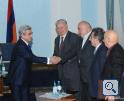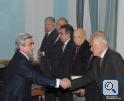Updates
Press releases
26
04, 2010
President Serzh Sargsyan received the members of the Governing Council of the RA Academy of Sciences
Today, President Serzh Sargsyan received the members of the Governing Council of the RA Academy of Sciences and Heads of the scientific and research institutes of the Academy.
President Sargsyan said that after the annual general meeting of the Academy it was necessary to discuss with the scientists the problems that hinder Armenia’s scientific development and find the means to eliminate them. “Previous discussions regarding this issue have set the right course. I believe our priority should be to closely connect science with the education and economy,” the leader of the country said.
Serzh Sargsyan highlighted three main avenues for developing education and science in our country. “The first avenue we should take is to reorganize the existing educational and scientific institutions and use them more efficiently, i.e. to carry on with the process of reformation. The second avenue is the creation of a new generation of the educational and scientific institutions, like the one created in Tavush – a modern boarding school, where teaching is conducted in foreign languages, with the application of the newest teaching methodologies. The third avenue is to provide our students and young scientists with the opportunity to study in the best educational and scientific establishments abroad,” the President of Armenia noted.
President Sargsyan informed that the rites of the Luys Foundation, which provides funds for the Armenian students’ to study at the world’s best establishments, would be doubled so that a greater number of the Armenian students could study abroad. Serzh Sargsyan stressed also the necessity of creating opportunities for the young scientists to get training abroad, noting that corresponding steps would be taken on that direction as well. “I know that there is a problem of housing for the young scientists, and to solve the problem we are ready to make serious investments. However, support will be provided only to those young scientists, who are going to seriously work in science, but not to those who after receiving master’s degree spend couple of months in a scientific institution and then leave to do something else,” President Sargsyan said.
The academicians conversed with the President of the Republic about a number of problems hindering the development of sciences in Armenia. The absence of relevant testing and production structures and facilities in the Academy was mentioned as the most pressing issue. As a result, scientific achievements cannot be fully employed in the economy. According to the academicians, the absence of necessary structures and facilities also prevents the flow of private investments into science which is imperative for conducting new research and obtaining scientific results. It was also noted that it would be necessary to create mechanisms for the enhanced cooperation between the institutes of the Academy and relevant economic structures.
Participants to the meeting spoke also about the necessity of developing humanitarian sciences, particularly those related to the Armenian studies. The President of Armenia said that it is also necessary to create conducive conditions for the scientists involved in the Armenian studies abroad. The importance of publishing the works of the Armenian scientists in foreign languages and presenting them in electronic format was also underlined.
Along with the science development issues, the academicians reflected also on the much debated issue of the Armenia-Turkey normalization process. They expressed their support to the President on this issue and expressed confidence that his actions have been efficient.
Representatives of the scientific community proposed to conduct such meetings regularly, noting that obviously such discussions proved to be very useful.
The President of Armenia approved the proposal and thanked the scientists for a candid and interested discussion, noting that it helped not only identify the problems but also to find concrete ways to overcome them.
President Sargsyan said that after the annual general meeting of the Academy it was necessary to discuss with the scientists the problems that hinder Armenia’s scientific development and find the means to eliminate them. “Previous discussions regarding this issue have set the right course. I believe our priority should be to closely connect science with the education and economy,” the leader of the country said.
Serzh Sargsyan highlighted three main avenues for developing education and science in our country. “The first avenue we should take is to reorganize the existing educational and scientific institutions and use them more efficiently, i.e. to carry on with the process of reformation. The second avenue is the creation of a new generation of the educational and scientific institutions, like the one created in Tavush – a modern boarding school, where teaching is conducted in foreign languages, with the application of the newest teaching methodologies. The third avenue is to provide our students and young scientists with the opportunity to study in the best educational and scientific establishments abroad,” the President of Armenia noted.
President Sargsyan informed that the rites of the Luys Foundation, which provides funds for the Armenian students’ to study at the world’s best establishments, would be doubled so that a greater number of the Armenian students could study abroad. Serzh Sargsyan stressed also the necessity of creating opportunities for the young scientists to get training abroad, noting that corresponding steps would be taken on that direction as well. “I know that there is a problem of housing for the young scientists, and to solve the problem we are ready to make serious investments. However, support will be provided only to those young scientists, who are going to seriously work in science, but not to those who after receiving master’s degree spend couple of months in a scientific institution and then leave to do something else,” President Sargsyan said.
The academicians conversed with the President of the Republic about a number of problems hindering the development of sciences in Armenia. The absence of relevant testing and production structures and facilities in the Academy was mentioned as the most pressing issue. As a result, scientific achievements cannot be fully employed in the economy. According to the academicians, the absence of necessary structures and facilities also prevents the flow of private investments into science which is imperative for conducting new research and obtaining scientific results. It was also noted that it would be necessary to create mechanisms for the enhanced cooperation between the institutes of the Academy and relevant economic structures.
Participants to the meeting spoke also about the necessity of developing humanitarian sciences, particularly those related to the Armenian studies. The President of Armenia said that it is also necessary to create conducive conditions for the scientists involved in the Armenian studies abroad. The importance of publishing the works of the Armenian scientists in foreign languages and presenting them in electronic format was also underlined.
Along with the science development issues, the academicians reflected also on the much debated issue of the Armenia-Turkey normalization process. They expressed their support to the President on this issue and expressed confidence that his actions have been efficient.
Representatives of the scientific community proposed to conduct such meetings regularly, noting that obviously such discussions proved to be very useful.
The President of Armenia approved the proposal and thanked the scientists for a candid and interested discussion, noting that it helped not only identify the problems but also to find concrete ways to overcome them.


